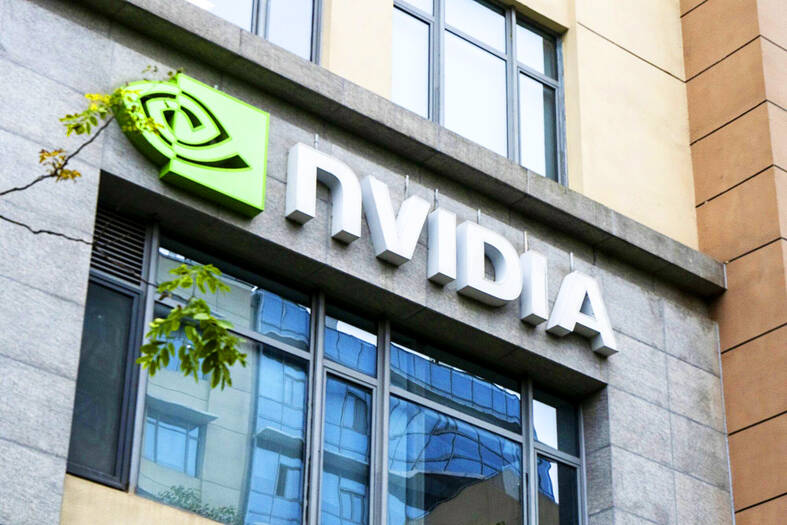Chip tester King Yuan Electronics Co (京元電子), which counts Nvidia Corp as its key customer, yesterday said it planned to spend a record NT$23.3 billion (US$712 million) on new facilities and equipment next year to catch up with rapidly growing testing service demand for chips used in artificial intelligence (AI) and high-performance computing (HPC).
The capital expenditures represent a surge of 68 percent compared with NT$13.8 billion this year.
Seventy percent of the spending would be allocated for the purchase of final chip testing equipment and related tools such as test handlers, the company said in a statement after its board of directors approved the annual capital spending.

Photo: Bloomberg
“As customers’ pressing demand for AI and HPC chip testing services grow fast, the company is striving to expand capacity quickly, allowing customers to launch new products soon,” King Yuan said.
To finance the facility and equipment spending, the board yesterday also gave the go-ahead to arrange a syndicated loan of NT$14 billion from First Commercial Bank (第一銀行), the company said in a separate statement.
King Yuan is adding new testing equipment and expanding capacity as Nvidia’s Blackwell GB200 chip enters volume production this quarter, and the new GB300 chip is in the pipeline. As chip design and chip manufacturing become more complicated, longer final testing processes are needed to ensure that chips meet functionality, reliability and quality requirements, the company said.
To cope with the sharp rise in demand, King Yuan said it has rented a factory shell in Miaoli County’s Toufen City (頭份) and is building a clean room and preparing for new equipment to move in.
It usually takes at least one year to complete construction, it said.
The company operates two fabs in Miaoli’s Jhunan (竹南) and Tongluo (銅鑼) townships.
The record-breaking capital spending came as the company expressed a bullish outlook about next year’s revenue growth, driven by the AI boom.
King Yuan said next year would be a “good year,” with revenue and gross margin likely to rise to an all-time high.
The growth would be mostly driven by AI applications, it said.
Other applications including chips used in smartphones, automobiles and industrial devices would be flat, it said.
The company reported an annual growth of 11 percent in revenue to NT$19.56 billion in the first three quarters of this year, compared with NT$17.65 billion in the same period last year. Gross margin rose to 34.82 percent from 32.97 percent a year earlier.
Net profit soared about 35 percent to NT$5.75 billion during the January-to-September period, compared with NT$4.27 billion a year earlier.

CHIP WAR: Tariffs on Taiwanese chips would prompt companies to move their factories, but not necessarily to the US, unleashing a ‘global cross-sector tariff war’ US President Donald Trump would “shoot himself in the foot” if he follows through on his recent pledge to impose higher tariffs on Taiwanese and other foreign semiconductors entering the US, analysts said. Trump’s plans to raise tariffs on chips manufactured in Taiwan to as high as 100 percent would backfire, macroeconomist Henry Wu (吳嘉隆) said. He would “shoot himself in the foot,” Wu said on Saturday, as such economic measures would lead Taiwanese chip suppliers to pass on additional costs to their US clients and consumers, and ultimately cause another wave of inflation. Trump has claimed that Taiwan took up to

A start-up in Mexico is trying to help get a handle on one coastal city’s plastic waste problem by converting it into gasoline, diesel and other fuels. With less than 10 percent of the world’s plastics being recycled, Petgas’ idea is that rather than letting discarded plastic become waste, it can become productive again as fuel. Petgas developed a machine in the port city of Boca del Rio that uses pyrolysis, a thermodynamic process that heats plastics in the absence of oxygen, breaking it down to produce gasoline, diesel, kerosene, paraffin and coke. Petgas chief technology officer Carlos Parraguirre Diaz said that in

SUPPORT: The government said it would help firms deal with supply disruptions, after Trump signed orders imposing tariffs of 25 percent on imports from Canada and Mexico The government pledged to help companies with operations in Mexico, such as iPhone assembler Hon Hai Precision Industry Co (鴻海精密), also known as Foxconn Technology Group (富士康科技集團), shift production lines and investment if needed to deal with higher US tariffs. The Ministry of Economic Affairs yesterday announced measures to help local firms cope with the US tariff increases on Canada, Mexico, China and other potential areas. The ministry said that it would establish an investment and trade service center in the US to help Taiwanese firms assess the investment environment in different US states, plan supply chain relocation strategies and

Japan intends to closely monitor the impact on its currency of US President Donald Trump’s new tariffs and is worried about the international fallout from the trade imposts, Japanese Minister of Finance Katsunobu Kato said. “We need to carefully see how the exchange rate and other factors will be affected and what form US monetary policy will take in the future,” Kato said yesterday in an interview with Fuji Television. Japan is very concerned about how the tariffs might impact the global economy, he added. Kato spoke as nations and firms brace for potential repercussions after Trump unleashed the first salvo of